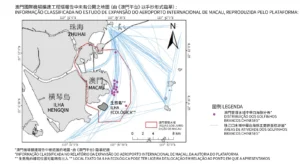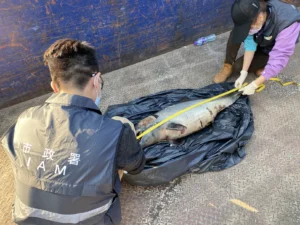Although the public consultation on the Zoneamento Marítimo Funcional and the Plano das Áreas Marítimas ended on 16 February 2024, the controversy over the ecological islands did not end with the consultation.
The DSPA, which is responsible for the Eco-Island project, has launched an Eco-Island webpage to explain the need for Eco-Island after the end of the consultation period. The authorities stressed that Macau’s only existing construction waste landfill, which has been in use since 2006, has received more than 49 million cubic metres of construction waste and is in a critical state of saturation.
According to data from the DSPA, the total volume of construction waste to be buried in Macau’s landfills in 2023 will be 1,682,970 cubic metres, which is equivalent to 841.5 (about 2,000 cubic metres) of an international standard swimming pool.
Legislator Ron Lam said the problem of landfills had existed for more than a decade. He saw the efforts made by the authorities at landfills in recent years, but the measures to reduce construction waste at source were far from adequate. “I have not seen the Government exhausting all means to tackle the problem, including the introduction of a second-stage charging scheme for construction waste, the provision of additional sorting facilities and regional co-operation,” he said.
Although the Waste management regime for construction materials came into effect on 17 January 2021, contractors who were awarded public or private projects or had completed tender submissions before the statute began were exempted from the payment of fees for waste produced from dumping construction materials at landfills for a period of three years after the commencement of the statute. This transitional requirement only ended on 17 January this year.
At present, the tipping fee for inert construction and demolition materials is MOP70 per tonne, while the tipping fee for special construction and demolition materials and other construction and demolition materials is MOP200 per tonne.
In Hong Kong, to tie in with the implementation of Municipal Solid Waste charging, various construction waste disposal charges will be increased from 1 April 2024, including the landfill charge from HK$200 per tonne to HK$365 per tonne, the sorting charge from HK$175 per tonne to HK$340 per tonne, and the public fill (inert materials) charge from HK$71 per tonne to HK$87 per tonne.
Site selection lacks scientific data support

When interviewed by the media, Tam Vai Man, the Director of DSPA, who is responsible for the construction of the eco-island project, explained that at present, Macau has a total of 85 square kilometres of waters under its jurisdiction. However due to the fact that some of the locations are navigation channels, the runways of the airport, and, above all, that Macau is situated in the west of the Pearl River Estuary, which is constrained by a line for drainage of floods and sand, and it cannot be filled up to the east any more, he hoped that members of the public would understand that the place was not intentionally chosen, but it is a relatively suitable place under the constraint of many constraints.
Legislator Ron Lam said the Government had never explained to the public why the location to the east of Zone A and south of the artificial island of the Hong Kong-Zhuhai-Macau Bridge was not feasible. “I think this can be one of the sites. The problem may be that the location is not big enough, but the bigger the ‘house’ you have, the more rubbish you would put there, and after filling one, you will need a second ‘house’, which is not a sustainable development.”
Urban planner Manuel Iok Pui Ferreira believes that the site (east of Zone A, south of the artificial island) may be constrained by air traffic control, shipping lanes and the impact on the city’s coastal image, which would prevent it from making the most effective use of the land space, and that the government needs to provide more information for comparison,” he said. “I agree with the Government that there is not much reclaimable space in Macau at present, but often the Government lacks a comparative proposal to tell the public what price will be paid if reclamation is not carried out, how the public will accept this price, and whether there are no other options available, resulting in no reclamation being carried out”.
Manuel Iok Pui Ferreira criticised that for such a major reclamation project, the Government offered only public relations publicity, and had failed to make the EIA report available to the public with adequate scientific and data support for the site selection. Under such circumstances, it was too hasty to reclaim the land.
“There is a complete lack of information on the state of the marine environment, the animal and plant species, the ecological value of the water body, the area of the Chinese White Dolphin, which is of great concern to the public, and the mitigation measures to be taken for the reclamation facilities,” the urban planner emphasised.
“Although the Government has stated that eco-islands have a serviceable life of not less than 20 years, in the long run, we are overdrawing the ecological resources of the next generation”.
Chinese White Dolphin Activity Tracks Coincide with Site Selection

According to the preliminary statistics of Plataforma, a total of 8 Chinese White Dolphin carcasses were found in the waters near Macau between 2019 and 2021 (see list), and since then the issue of dolphin conservation has begun to receive attention from the community.
The Facebook page “Chief of Macau Ecology”, founded by two Macau ecology enthusiasts, pointed out that the waters south of Coloane are a hotspot for the Chinese white dolphin, which is a Class 1 national wildlife species, and that the protection of the dolphin is of great significance for eco-tourism and economic development, scientific research and education, and cultural significance.
The Director of DSPA, on the other hand, stressed that the site of the ecological island was not a place where the Chinese White Dolphins often visit. He also said that according to some previous EIA data, the Chinese White Dolphin’s activity area in Macau is at the southern end of the airport runway, not the site of the Ecological Island.
According to “Figure 5.3-15 Main Survey Tracks of Chinese White Dolphins in the Pearl River Estuary Waters” and “Figure 5.3-17 Distribution of Chinese White Dolphins in Macao’s Management Waters” in the “Environmental Impact Assessment Report for the Macao International Airport Expansion Project”, in fact, there is some overlap between the selected site of the Ecological Island and the range of Chinese White Dolphin’s activity tracks in the waters near Macau.
Since the content of the online version of the report was blacked out due to copyright issues, Plataforma went to the office of the AACM to check the paper report. However, photographs and video recordings were not allowed, so our reporter could only copy the relevant tracks and distribution maps in handwritten form.
The EIA report reads, “During the survey period (June-October 2016, November-December 2017, January-May 2018, and June-November 2019), a total of 24 voyages were made in Macau-managed waters, with a total sailing time of 37.6 hours and a total voyage distance of 849.74km, and 17 groups of Chinese White Dolphins were sighted for a total of 52 sightings. In the waters under Macau’s management and the surrounding waters, a total of 88 voyages were made, with a total sailing time of 574.34 hours, a total distance of 10,171.66km, and 349 sightings of Chinese White Dolphins were recorded”.
In addition, the IAM has commissioned professional organisations to conduct the Survey of Chinese White Dolphins in Macau Management Waters in 2018-2019 and 2020-2021. Legislator Ron Lam said that he had obtained the said report from the IAM through the Legislative Council, and in the report, the location of the distribution of the Chinese White Dolphins was different from what the authorities had said recently, and the report also recommended that Macau should designate the boundaries of the protected zone.
Conflicting Roles of Government Departments
The Hong Kong Dolphin Conservation Society, Macau Green Student Union and Ken Kwan, local ecologist, launched an online petition against the government’s “Eco-Island” project, collecting more than 1,600 signatures to stop the project in order to protect the Chinese White Dolphin’s important habitat.
During the consultation period, the Director of DSPA, said that with the continuous construction of Zone A and various projects in Macau, the pressure on the construction waste landfill is getting more and more serious, and the authorities will press ahead with the construction of the ecological island, and will strive for the submission of the relevant reports to the Central Authorities for approval within 2024.
When asked whether he felt that the government seemed to “force” the launch of the ecological island, Lam believed that there was a dilemma and a contradiction in the roles of government departments, which have lost their professional judgement when orders from higher levels conflict with their professionalism. “The DSPA does have to deal with construction waste landfills, but at the same time, it is the entity in charge of environmental protection in the sea area. Therefore, if we build an ecological island from the perspective of dealing with construction waste, I think the department has not done anything wrong, but from the perspective of ecological conservation, I think this is an unreasonable choice.”



